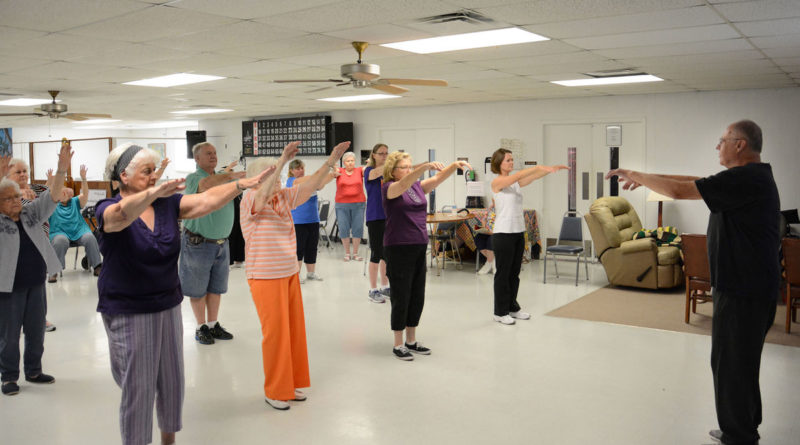Benefits of Tai Chi – Exercising the Body and the Mind
Whether we’re at home, at work or on the go, distractions abound. Smartphones, email, text messaging and social media are always within reach. We listen for the buzz, ding or ring, notifying us of a new message.
In a society where busyness is the norm, intentionally taking time to be mindfully aware of ourselves and our surroundings can feel foreign or selfish. The opposite holds true in the centuries-old Chinese martial art known as tai chi, where mindfulness, or self-awareness, is a basic tenant.
Tai chi is a low-impact exercise that requires no special equipment and is comprised of gentle, flowing movements with names like “Part the Wild Horse’s Mane” and “Grasp the Peacock’s Tail.” The practice encourages participants to push aside worries and stressors and focus on the present. This ancient Chinese tradition has caught the attention of people throughout Central Texas, where various fitness groups engage in the exercise together. One of the newest groups is at the Belton Senior Activity Center. Dr. Richard Trautman, a part-time psychiatrist at the Olin E. Teague Veterans’ Medical Center in Temple, recently began leading a tai chi class there.
Trautman, 74, of Belton, has been practicing tai chi for about 23 years. He incorporates it into his daily morning routine and believes it has helped him age better than he would have otherwise.
“I think it keeps things operating,” he said. “You’ve got to listen to your body.”
While Trautman began his practice of tai chi in his 50s, he said people of all ages can reap its benefits. Tai chi teaches patience, which could particularly benefit children, if the exercise is tailored toward them, he said. Beginning tai chi earlier in life could have additional benefits, as well.
“Prevention is key,” Trautman said. “If people start doing this at a younger age, then they could be less affected by age.”
Balance and stability
One of the biggest benefits associated with tai chi is an improvement in balance and stability, Trautman said. For this reason, the Centers for Disease Control and Prevention recommends tai chi as a method of fall prevention among older adults. Each year, emergency departments treat about 2.8 million people ages 65 and older for fall injuries, according to the CDC. Exercises such as tai chi that strengthen the leg muscles and improve balance can help.
Trautman’s wife, Kathleen, has experienced this specific benefit firsthand. She reflected on a time about four years ago when she had two serious falls in less than a year. She later began practicing a specific set of tai chi movements regularly and has not fallen since.
“I think I’m much more aware,” Kathleen Trautman said. “When I stand, I make sure I’m steady before I take my first step.”
Research shows the balance and stability that come along with tai chi can also benefit those with Parkinson’s disease, according to the National Center for Complementary and Integrative Health. Additional research suggests tai chi may reduce knee osteoarthritis pain, help people with fibromyalgia and back pain and improve quality of life in people with heart failure or cancer, the NCCIH said.
As a psychiatrist, Trautman can speak to the mental or psychological benefits associated with tai chi. The meditative quality of tai chi can help quiet the mind, he said. He has recommended some patients give it a try for that reason and wishes more doctors in general would recommend it to their patients. Tai chi can also help people struggling with anxiety, depression and sleep problems.
“Doing this kind of repetition in a mindful way, it just settles things down,” Trautman said.
During his initial tai chi class at the Belton Senior Activity Center in September, the doctor outlined the many benefits of tai chi for the dozens of participants who turned out. The group started with a series of warm up motions then watched Trautman with a close eye as he led everyone through a series of graceful, flowing movements. Most had never participated in such an activity before and a round of giggles occasionally erupted as people tried to catch on to the exercises.
It didn’t take long for people to get the hang of it and the stresses of the day eventually began to float away as people focused only on themselves and their tai chi practice.
“I think it felt very selfish for me,” said Cindy Meredith after participating in the class. “I deserve this. I just need the moment. Everything is blocked out and now I can just focus.”
Cindy Meredith and Pat Sleeth, both of Belton, said they plan to continue participating in the class and experience the benefits in store.
“We can be proactive and say, ‘I can be in control of my body and help maintain it as long as possible,’” said Sleeth. “I honestly believe that.”
Trautman said it takes about 12 weeks of practice before one can begin to see the benefits of tai chi. Memorizing the movements takes time, too, and Trautman said it’s impossible to learn everything there is to know about tai chi. He continues to learn something new each day, he said.
While Trautman hopes people of all ages will try tai chi, he said people should first check with their physician, just as they would before beginning any new exercise regimen.




